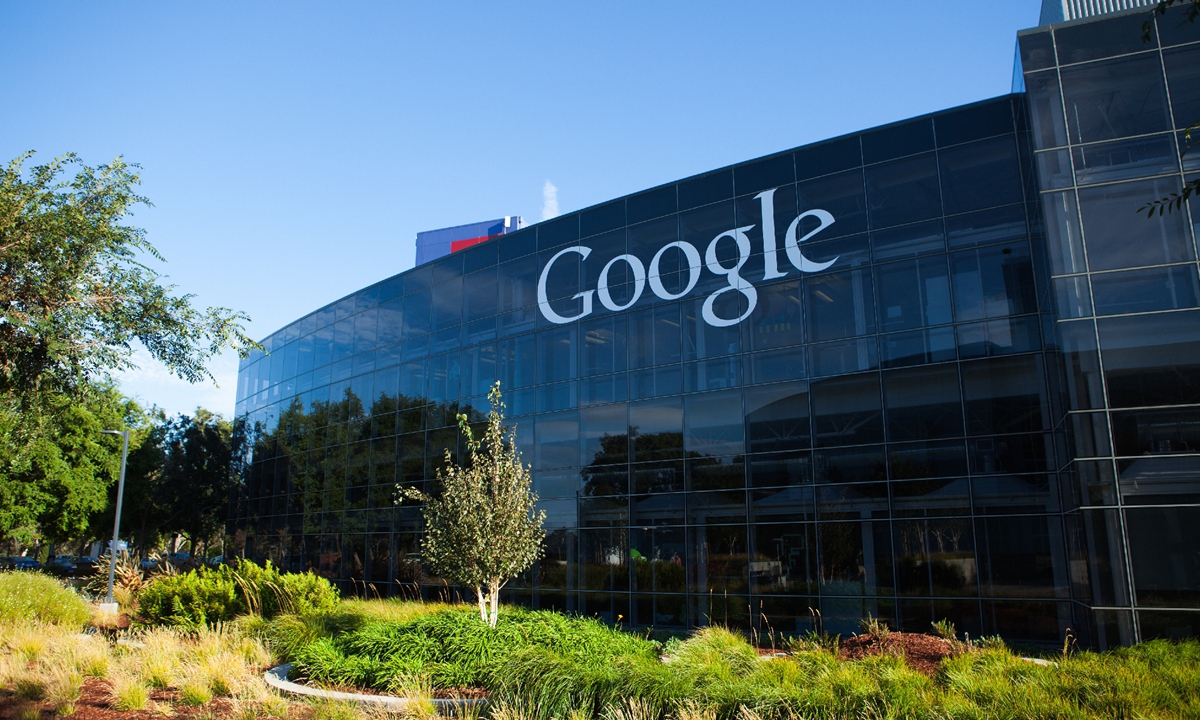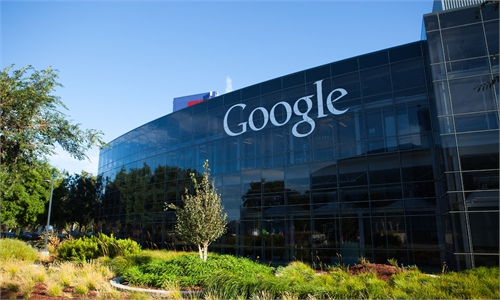Multinationals should not become ‘co-pilot’ to divide world: Global Times editorial

Google in California,US Photo:VCG
The Russia-Ukraine conflict is increasingly intensifying. Ukraine's media outlets suddenly exposed that all of Russia's military and strategic sites were now viewable on Google Maps at maximum resolution of about 0.5 metres per pixel. The sites include intercontinental ballistic missile mines, command posts and secret landfills. But Google soon denied the reports. "We haven't made any blurring changes to our satellite imagery in Russia," a Google spokesperson said. US media said that those images were available on Google Maps long before the Ukraine crisis.Even if this report is true, its impact on the Russia-Ukraine situation is very little. Today's military satellite technology has been very mature, and many large-scale military facilities are already transparent and do not require "additional technical support" from Google. This speculation has received much attention because it echoes a concern that the boundary of conflicts or wars has been greatly expanded, far beyond traditional military contests' fields, with games in sectors such as diplomacy, trade, finance, information, public opinion being intertwined.
In this process, the role played by multinational giants has become increasingly apparent. According to US media statistics, since the Russia-Ukraine conflict, besides large energy companies such as Shell and ExxonMobil as well as airplane giants such as Boeing, technology giants including Apple, Microsoft, Intel, Twitter have also jumped on the bandwagon to pressure Russia in various forms. In other words, American multinational corporations, especially internet giants that grasp vast amounts of information and data, are at significantly higher risk of being "weaponized."
"Let politics be politics, and business be business." This motto has been regarded by many people as a glamorous veil of "American values" in the past. It may be an ideal state, but the reality is far more serious. From the choice of multinational companies, we have seen a clear picture - almost without exception, US multinational companies have maintained a high degree of consistency with the US government. But it cannot be said that these multinational corporations are willing to become Washington's political tools. To be more precise, they are forming a "political binding" relationship. Of course, there are many reasons for this.
In recent years, executives of some American multinational corporations have shown a keen interest in geopolitics and frequently "crossed the line." Perhaps success in business and technology has strengthened their self-confidence in the ideological realm. Of course, commercial interests cannot be ruled out. For example, after the Russia-Ukraine conflict broke out, Google took a series of restrictive actions against Russia, and Google Translate once offered the option to translate "dear Russians" into "dead Russians." Obviously, these will not have much impact on the Russia-Ukraine situation. To a large extent, it shows a political posture in order to gain the recognition of the Western world by "choosing sides."
In the context of Washington's increasing emphasis on competition and confrontation, although some multinational corporations are trying hard to avoid "choosing sides" in the great power game, they have been regarded by Washington as an ideal tool to achieve geopolitical goals. Amazon.com founder Jeff Bezos once said blatantly, "If big tech companies are going to turn their back on US Department of Defense, this country is going to be in trouble." A typical example is that the rules of social media platforms such as Twitter and Facebook always serve as a helping hand to adding fuel to the domestic political turmoil in "non-democratic" countries, and are even inextricably linked with "color revolutions."
Multinational corporations of the US and the West have, actively or not, been involved in the Russia-Ukraine conflict with unprecedented scale and depth. The US troops haven't been deployed in Ukraine, but Washington is behaving like an octopus, waving its tentacles to exert all-around influence on the war. From supplying weapons to sharing intelligence, and long economic sanction front, in addition to information warfare and a psychological offensive to sway public opinion, multinational corporations have played an important role. In this big geopolitical duel that the US is instigating by mobilizing all available resources and using all available means, Western multinational corporations have been tied by Washington to the co-pilot position of its chariot to divide the world.
Of course, it doesn't mean Washington can mobilize these resources indefinitely as such an approach means reversing globalization. Forcibly and overly utilizing these multinationals, turning them from major economic force promoting globalization to political "accomplices" that divide the world, will not only damage those corporations' long-term interests, but will backfire on the US.



